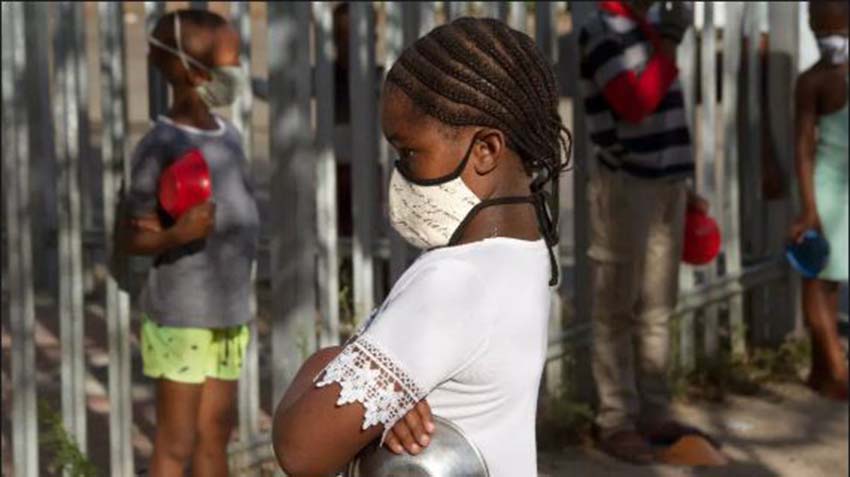Pandemic ‘Threatens To Roll Back Years Of Progress In Reducing Child Poverty’
Meanwhile, the International Labour Organization has warned that young adults are being hit hardest by the wave of redundancies triggered by the Covid-19 crisis in countries across the globe.

Children wait in lines to receive a meal at a crèche near Cape Town in South Africa, on May 14, 2020. Photo Credit : Rodger Bosch, AFP
The economic fallout from the Covid-19 pandemic could push as many as 86 million more children into poverty by the end of 2020, a joint study by Save the Children and UNICEF showed Wednesday.
That would bring the total number of children affected by poverty worldwide to more than 670 million, an increase of 15 percent over last year, the two aid agencies said in a statement.
Nearly two-thirds of those children overall live in sub-Saharan Africa and South Asia.
However, the pandemic-driven increase is expected to occur mainly in Europe and Central Asia, according to the study, which is based on World Bank and International Monetary Fund projections and population data from some 100 countries.
"The scale and depth of financial hardship among families threatens to roll back years of progress in reducing child poverty and to leave children deprived of essential services," UNICEF executive director Henrietta Fore is quoted as saying in the statement.
The #COVID19 pandemic could push up to 86m more children into household poverty by the end of 2020. We can’t let this 15% increase happen.
— UNICEF (@UNICEF) May 28, 2020
Poverty is not inevitable, we can and must do more #ForEveryChild. @save_children
With immediate and decisive action, "we can prevent and contain the pandemic threat facing the poorest countries and some of the most vulnerable children," added Save the Children head Inger Ashing.
They are "highly vulnerable to even short periods of hunger and malnutrition — potentially affecting them for their whole life," Ashing warns.
The two organizations call on governments to rapidly expand their social security systems and school feeding to limit the effects of the pandemic.
Meanwhile, the International Labour Organization has warned that young adults are being hit hardest by the wave of redundancies triggered by the Covid-19 crisis in countries across the globe.
In a report published on Wednesday, the Geneva-based organization found that one in six of those it had surveyed aged 18 to 29 who had been in work before the pandemic began said they had since stopped working.
"As we recover from the pandemic, a lot of young people are simply going to be left behind. Big numbers," said ILO chief Guy Ryder.
-

Moldovan youth is more than ready to join the EU
2024-04-18 -

UN says solutions exist to rapidly ease debt burden of poor nations
2024-04-18 -

'Human-induced' climate change behind deadly Sahel heatwave: study
2024-04-18 -

Climate impacts set to cut 2050 global GDP by nearly a fifth
2024-04-18 -

US sterilizations spiked after national right to abortion overturned: study
2024-04-13 -

Future of Africa's flamingos threatened by rising lakes: study
2024-04-13 -

Corporate climate pledge weakened by carbon offsets move
2024-04-11 -

Humanity lost 'moral compass' on Gaza: top UN official
2024-04-10 -

No.1 Scheffler says patience and trust are secrets to success
2024-04-10 -

From homeless addict to city chief: the unusual journey of Canadian mayor
2024-04-10
